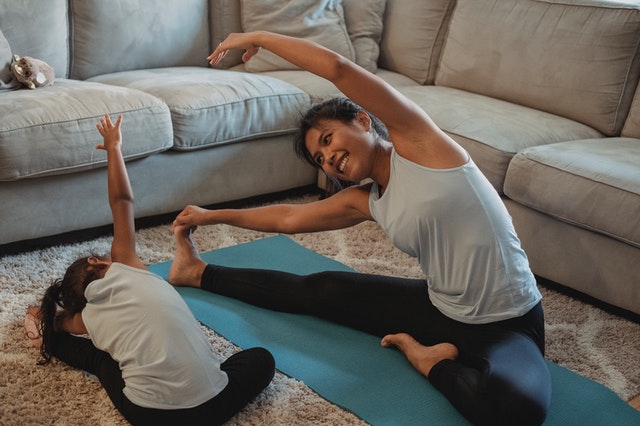The last two years have been strange, to say the least. Luckily for us, the human spirit is resilient and tenacious. What is fascinating is that even in the chaos, we have managed to find aspects in our daily lives that have assisted us in our endeavour to cope with new realities. Some helpful patterns of behaviour have been observed during this time that we can incorporate moving forward.

Community, community, community
Where would we be without our communities? Whether it is your innermost circle that just knew when you needed some extra support without you even saying it or an elderly man in your complex who took your dustbin out on collection day because he knew that you were sick with Covid and wouldn’t be able to do it. We have learned more than ever how important community is and that we were never meant to go through this life alone. We are wired for connection and relationships, the impact of not having access to our communities are coming into view with each new day.
The saying “you don’t know what you have until it’s gone” comes to mind here, but much like we promise to do all things healthy when we recover from an illness, the trap one could fall into here would be to become complacent again when our access to the community is no longer limited. While it is always important to be honouring our own needs and capacities, fostering connection and community requires intention and, at times, effort. This effort is well worth the investment when it is aligned with our needs at that moment.

Getting physical
For so long, exercise has been promoted as something that benefits our physical body. This is true, of course, but exercise is also crucial for our mental health. The type of exercise need not be specific, but it is so important that we simply move our bodies. Recent research is showing us that we carry stress, trauma, and anxiety in our bodies and that in order to release the emotional energy associated with these experiences, we need to move our bodies to assist in completing these stress cycles. What we don’t realise is that our daily stressors and our experience of stress are two different things. Often, we focus on changing our stressors and we forget to address our actual stress. One of the most effective ways of doing this is through movement. Whether it be running, hiking, yoga, weight-lifting, cycling, dancing, or swimming, the point is simple: move your body.

Head out into nature
There have been times when our only opportunity to go out was into nature. Getting out into nature is good for our nervous systems. Research shows that being in nature or being exposed to nature in some way automatically reduces our experiences of anxiety and depression. Whether it was going out for a walk in your neighbourhood, travelling out a little way to go for a hike, or even watching virtual game drives on TV is not important. What is important is that we integrate exposure to nature into our routines not only because it’s enjoyable but also because it is good for us. This is especially important to bear in mind in the fast-paced society we live in. It is very easy for our lives to run away from us, with each day melting into the next without us being present and slowing down long enough to enjoy the moment. This is what being in nature offers us, the opportunity to slow down and become present, to notice the beauty around us, and maybe even to notice the beauty within us, too.

Learning to bend, so we do not break
Flexibility and adaption have been consistently demanded of us in the last two years. We have learned how to work remotely, how to school our children remotely, how to order groceries online, and how to have celebrations online. People have even run marathons in their backyard! With change being a constant in our lives it follows that flexibility is necessary if we ever hope to keep up. The learning here is to look at the way that things work in your current life, across all the domains that you find yourselves in, and to simply assess – what is working and what is not working.
Oftentimes people do make this kind of assessment, but instead of looking at what is working and what is not working, they look at what is good versus what is bad or what is right versus what is wrong. These can often be unhelpful questions because they may keep us stuck in a rigid pattern that does not serve us. Again, this needs to be asked across domains. Is it that the frustration you feel at the lack of participation from your employees on a Zoom meeting is trying to tell you that this discussion should rather be an email? Is it that the chaos and tantrums that ensue from rushing your child home from school should rather be replaced by a slow, calming 30-minutes where you stay at school and share a snack before coming home? The point is to keep what works and to change what doesn’t.

Setting boundaries
So now that we’ve spoken about being appropriately ‘flexible’, it is important to point out that there should be a limit to this. While we have become magnificently adaptable, for some this has meant that their boundaries have been pushed and pushed … and pushed. With home being work and work being home, it has become exceptionally difficult to create some clear structures and boundaries to our days.
In contrast, in the midst of the worst of Covid, it was almost as if it gave us permission to become firmer with our boundaries. We were able to say no in places where we normally would not have said no, creating space for our needs and our capacities and allowing those to be our guides for decision-making – as it should be. However, as the restrictions and the threat have decreased, with increased vaccinations and hospital capacity outside of the waves, once again some are finding it difficult to hold the line when it comes to their boundaries.
Remember, boundaries are the intersection between our needs and our capacities. Each person is responsible for expressing their needs and managing their capacities and therefore managing their boundaries. Manoeuvring to get your needs met is not selfish, but rather responsible. When our needs are met we are more productive, more motivated, more regulated, and more able to engage in the world in a way that is meaningful and allows for self-actualisation.
This may look like being unwavering in sticking to your work hours while working from home, or even making sure that you have a designated workspace so that when you leave that space you have the experience of also ‘leaving work’ for the day. It may look like saying no to social engagements, for no other reason than you just don’t have the capacity to go. It may look like expressing your needs in relationships that you never have before – your need for empathy over advice, your need for more quality time, your need for more activity or spontaneity, or your need to slow down. Whatever this looks like for YOU, it is important that we honour our needs and our capacity.

Accepting differences
We have also learned that people are exceptionally different. Different in coping mechanisms, views about the world, needs, capacity, and much more. Just take our views on vaccinations, for example. There has been so much debate and at times, just downright trolling (mostly online) which is a pointless exercise. People are different and have their sense of what is good for them – as it should be. The only person that can know where their boundaries lie is themselves (see point 5). This is not to suggest that we must agree with everyone, that is unreasonable. It is suggesting that we allow enough space and acceptance for people to make their own decisions. This is not only in the spirit of benevolence for the other person but also for the person giving the acceptance. This is because you cannot control what another person will or won’t do, so trying to take responsibility for it will only cause you frustration and anxiety.
That being said, there are times where it is both appropriate and necessary to give input into someone else’s life. However, when this is done it is important that there is an already established relationship with the person that will be able to sustain this kind of input in an effective manner. Even psychologists have to build up enough ‘credit’ in the form of emotional closeness in relationships to be able to offer input to their clients. The emphasis being on offer as input is also most effective when it is tentatively afforded as opposed to dogmatically demanding that it be adhered to.
While the last two years have been challenging, there is a whole lot of lemonade to be made from the giant lemons we have been given. Especially in the form of learnings and mental takeaways. While this in no way seeks to diminish the severe pain and trauma that has been experienced over the last two years, it does offer the opportunity for meaning and value in the midst of this suffering so as to equip us to move forward stronger, together.

Ashleigh Yaman is a Counselling Psychologist who is passionate about facilitating satisfaction and wellness in relationships, whether it be in relationships with others, or in one’s relationships with oneself. She provides individual therapy to children, adolescents and adults; couples therapy; family therapy and; parental guidance therapy.









Why your child should have a tutor
What happens during each stage of grief?
Mentorship for the Mentee
Is the fear of a recession affecting your mental health?
How to boost 8 different forms of health
Conrati nominated as a Top Environmental Consulting Company by Futurology
How social media affects mental health
Understanding Bipolar Disorder